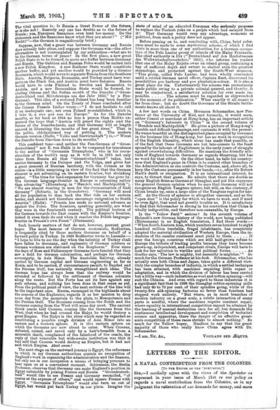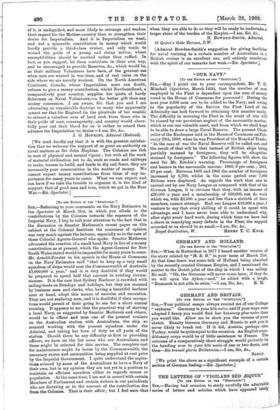LETTERS TO THE EDITOR.
A NAVAL CONTRIBUTION FROM THE COLONIES. [To THR EDITOR OP THE "SPECTATOR.") • cordially agree with the views of the Spectator as expressed in your issue of March 21st re our policy as regards a naval contribution from the Colonies, as in my judgment the reiteration of our demands for money, and mom of it, is undignified, and more likely to estrange and weaken their regard for the Mother-country than to strengthen their desire for Imperialism. And it is Imperialism we want, and not a miserable contribution in money which would hardly provide a third-class cruiser, and only tends to wound the pride of a young and rising nation, whose susceptibilities should be soothed rather than ruffled. In fact, as you suggest, let them contribute in their own way, and be encouraged to provide Reserves, &c., which would be, as their military Volunteers have been, of the greatest use when men are wanted in war-time, and of real value on the side where we are navally weakest. On the North American Continent, Canada, whose Imperialism none can doubt, refuses to give a money contribution, whilst Newfoundland, a comparatively poor country, supplies her quota of hardy fishermen as Naval Volunteers,—a far better gift than any money concession. I am aware, Sir, that you and I are advocating an unpalatable doctrine to many who apparently 3annot see that for England (in the plenitude of her wealth) to extract a valueless sum of hard cash from those who in their pride of race, consanguinity, and country would cheer- fully pour out their blood for us is rather to retard than advance the Imperialism we desire.—I am, Sir, &c., J. 0. HOPKINS, Admiral (Retired).
[We need hardly say that it is with the greatest satisfac- tion that we welcome the support of so great an authority on naval matters as Sir John Hopkins. The Colonies are rich in men of physical and mental vigour ; but with all the work of material civilisation yet to do, such as roads and railways to make, houses to build, and lands to dig and fence, they are necessarily poor communities in the matter of money. We cannot expect money contributions from them of any im- portance for many years to come. What we can expect, and can have if we take the trouble to organise it, is the kind of support, that of good men and true, which we got in the Boer War.—ED. Spectator.]











































 Previous page
Previous page